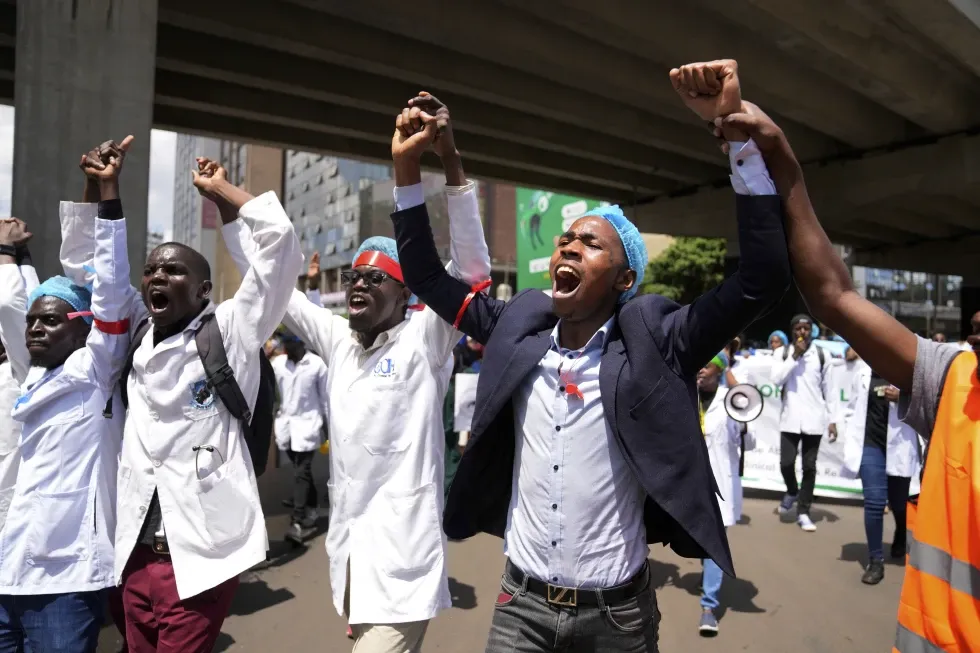A mega sigh for doctors after World Asthma Day
This week unfolded like a movie... On Monday, the Labour Relations Court urged doctors and the government to end the strike in 48 hours. On Tuesday, World Asthma Day, some doctors demonstrated how to use inhalers during celebrations held in Kenyatta Hospital. Finally, at 4:00 am on Wednesday, doctors signed an agreement before the 2:30 pm deadline and called off the strike.
Here are the main stories in public health this week:
- 257 dead and 250,000 displaced due to floods
- AstraZeneca withdraws Covid-19 vaccine worldwide
- Kenya's tobacco stakeholders call for evidence-based warnings on tobacco packaging
In this edition
SPOTLIGHT: Why cholera, why now?
HEADLINES: Top 3 stories in Public Health this week
INSIGHT: Doctors did it
PAUSE: This Week In: Education
NEWS: Other stories in Public Health this week
QUICK: Other stories worth a mention
REGION: Top stories across the region in Public Health
EXTRA: World Asthma Day 2024: Asthma education empowers
SPOTLIGHT
Why cholera, why now?

“Despite our successful control efforts, the ongoing heavy rains and flooding have led to a confirmed case of cholera reported on April 26, 2024 in Tana River County." Public Health PS Mary Muthoni
Since then 44 cholera cases have been reported in Tana River County and Dr Pius Mutuku, medical epidemiologist in the MOH, says the government has mounted a multisector emergency response led by Kenya Disaster Emergency Operations Centre in Nairobi.
Cholera, a bacterial infection caused by ingesting contaminated food or water, leads to severe dehydration and can be fatal within hours if left untreated. What is the link between cholera and flooding? During heavy rainfall, faecal matter contaminated with the Vibrio Cholera bacteria can be carried away by surface runoff towards water bodies reserved for human consumption.
The government is distributing cholera contingency supplies to manage patient symptoms and other supplies to purify water sources and treat household water in all high-risk areas. Communities are also advised to boil or treat drinking water, practice regular handwashing and immediately seek treatment for symptoms.
When it rains it pours. Last week we covered growing malaria cases and right now the waterborne diseases we memorised for KCPE are an increasing reality as flooding continues. Once again, behaviour change is power and regular handwashing can make a difference in the case of cholera prevention.
HEADLINES
The week's main stories
- 257 dead and 250,000 displaced due to floods: Government Spokesperson Isaac Mwaura said the government is mobilising nearly Sh4 billion to support recovery and relief efforts. On Wednesday Interior CS Kithure Kindiki gazetted Friday, May 10, as a public holiday for purposes of countrywide tree-growing activities in solidarity with all those affected by the floods.
- AstraZeneca withdraws COVID-19 vaccine worldwide: COVID-19 variants constantly change so new vaccines must be regularly formulated to effectively and safely treat newer variants. There is a surplus of available newly formulated vaccines from competing companies such as Pfizer and Moderna decreasing the demand for AstraZeneca's vaccine. We've come a long way.
- Kenya's tobacco stakeholders call for evidence-based warnings on product packaging: This comes after the Ministry of Health proposed graphic health warnings across both traditional tobacco products and modern nicotine products. "The message from stakeholders in these public participation sessions is the images should correlate to the risk associated with the product,” said British American Tobacco (BAT) Kenya’s scientific engagement manager, Douglas Weru.
INSIGHT
Doctors did it

In our previous newsletter, we broke down the doctors' strike citing the main issues and stakeholders involved and encouraging you to reflect on solutions. On 8th Wednesday, after a heated 4 am discussion, the doctors union (KMPDU) signed a return to work agreement with the government ending their 56-day national strike.
Where was the solution hiding you ask? On Monday, The Labour Relations Court gave both parties 48 hours to sign an agreement or else the court would make a final decision after listening to their petitions. Some of the items agreed upon from the Collective Bargaining Agreements 2017 (CBA's) include:
- Doctors will receive pending salaries in 15 days and the national government will disburse sh.3.5 billion to counties for payment within five years.
- Comprehensive medical cover for all doctors will be implemented by 1st July 2024.
- Post-graduate school fees for doctors from 2018 will be paid by 1st July 2024
- Governors will create a new CBA with doctors in 30 days and sign it in 90 days.
Much as KMPDU agreed to return to work, they will continue fighting for intern wages — sh. 206,000 under the 2017 CBA — so interns will not be posted in 60 days. The union has signed on as an interested party in a court case on the same despite the government advising them to drop the case so they can settle out of court.
In 2017, Kenyan doctors working in public hospitals held the longest strike in Kenya's history — a hundred days — to demand better wages and 2024's strike comes in second place.
"The loss of lives along the way has been heavy and since we've been here before my advice is that we should never find ourselves here again. There's no victory here, we are in a hostage situation" - Abidan Mwachi, KMPDU chair.
Health Cabinet Secretary, Susan Nakhumicha, acknowledged the issues that led to the doctors’ strike are systemic and precede the current government so require a lasting solution. “The deal breaker was ‘is this a deal for execution or just for signing’, I’m confident in what we have signed today, having consulted widely, this is a deal that is going to be implemented by all of us " she reassured Kenyans.
It's easy to experience fatigue from news about strikes but systemic changes call for strategic sustained efforts. CS Nakhumicha herself said the doctors put up quite a fight and have proven to be better negotiators than the government. Let's hope that the agreement is implemented so that we never find ourselves here again as Abdian said.
PAUSE

NEWS
What else we learned
- This International Nurses Week, Dr Monica Juma, the national security advisor to the President, encouraged nurses to pursue research as a career option due to increasing clinical trials in Kenya. Nairobi Hospital CEO, James Nyamongo, said their College of Health Sciences offers specialised training in ICU, nephrology, mental health etc and last year 57 nurses became speciality nurses.
- Kenya Women Teachers Association (KEWOTA) estimates that in the last two years, 60 teachers have died by suicide while 30% of tutors in Kenya exhibit signs of depression and anxiety. "There is a mental wellness department at the Teachers Service Commission but records show many teachers don’t visit it because some of the mental issues emanate from the employer,” KEWOTA CEO, Benta Opande said.
- Community Health Promoters (CHP), a bridge between health facilities and communities, are using the electronic Community Health Information System (eCHIS), to send diagnostic data directly from households to facilities, enabling timely malaria treatment. "You can send mobile messages to households you're planning to visit to avail all the required documents ahead of your visit," says Jackline, a Community health promoter.
QUICK
One-liners
- Sakaja launches construction of first public hospital in Mlango Kubwa [The Star]
- Cancer care mirage: The agony of accessing help from the country's facilities [The Standard]
- Five ways AI-powered startups are changing healthcare in Kenya [Business Daily]
- West Pokot health players seek ways to end triple threat in county; teen pregnancies, rising HIV infections and Gender-Based Violence [The Star]
REGION
What's happening next door?
[UG] Rising cases of paediatric HIV in Masaka raise concerns: Dr James Elima, the Masaka regional hospital director, attributes the surge to a lack of maternal attendance at specialist check-ups and delayed initiation of treatment. [Read]
[UG] Mudslides kill seven in Kasese and Bunyangabu, hundreds displaced: Four women from the same family lost their lives as Bunyagabu County legislator, Mr Davis Kamukama, appealed to the Office of the Prime Minister for assistance supporting those affected. [Read]
[TZ] Tanzania counts losses after Cyclone Hidaya: The government said on Thursday, May 9, 2024, that five people died and seven others were injured following the landing of Cyclone Hidaya on the southeastern coast of the Indian Ocean. Prime Minister Kassim Majaliwa has directed disaster management committees to ensure that aid and humanitarian assistance reach respective disaster victims. [Read]
[RW] Breaking barriers - Empowering individuals with Down syndrome through inclusion: Edwige Musabe, Executive Secretary of the Rwanda Down Syndrome Organization (RDSO), says people living with the condition face challenges accessing employment due to societal perceptions of their capabilities. Through its Talent4U program, RDSO aims to create an inclusive environment in Rwanda where individuals with Down syndrome can realise their full potential. [Read]
[ET] Vaccine, and medicine shortages pave the way for epidemics in 10 regional states: A performance report presented to Parliament by Mekdes Daba (MD), minister of Health, reveals 549 mothers and 5,716 infants have lost their lives to disease over nine months. Mesay Hailu, director-general of EPH, emphasized the importance of regional coordination efforts in preventing the spread of disease. [Read]
EXTRA
Asthma education empowers
Dr John Ndung'u encourages patients to learn the correct technique for using inhalers as they are a key treatment option for asthma — they deliver medication directly to the lungs during an asthma attack.
Watch the story below for more insights into this condition.
World Asthma Day:
— Citizen TV Kenya (@citizentvkenya) May 7, 2024
Parents ask govt to ensure Asthma drugs are available
Event commemorated at the Kenyatta National Hospital
Some causes of asthma include smoking, drug abuse and dust #TheExplainer @YvonneOkwara pic.twitter.com/3hUui2ZBAd
That's it from me. I can only describe writing this edition as a scene from the fight for Kenya's independence and I hope the freedom fighter in you sees you through any challenges this week. Let us know how you feel after reading this through the email below and subscribe to receive this weekly.
